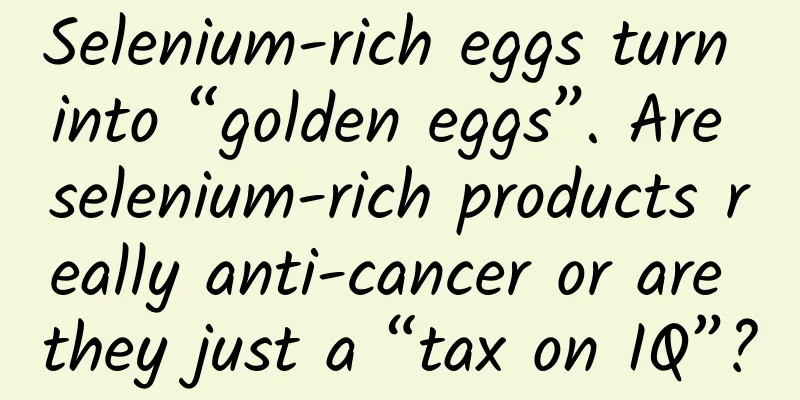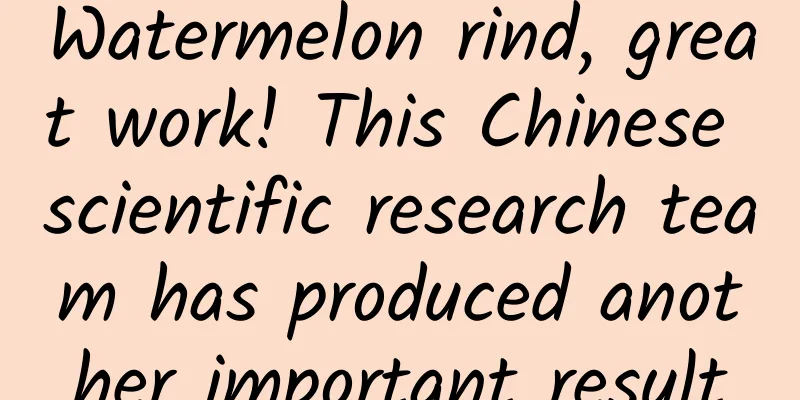Selenium-rich eggs turn into “golden eggs”. Are selenium-rich products really anti-cancer or are they just a “tax on IQ”?

|
Author: I am Yun Wuxin, PhD in Food Engineering and a senior R&D staff in the food industry Reviewer: Ruan Guangfeng, Director of Science and Technology Department, Kexin Food and Nutrition Information Exchange Center gossip There are many "selenium-rich products" on the market, claiming to have health benefits such as "anti-cancer". Many places and many businesses are vigorously promoting it as a "high-end product". However, a recent hot search has questioned this type of product. Next, let’s sort out “Selenium and health” and “Selenium-rich foods”. analyze Let me give you the answer first: there is really no need to pursue selenium-rich foods. Let’s talk about it in detail. 1. Selenium is an essential element for the human body Life activities are based on proteins, and dozens of proteins in the human body contain selenium. Many physiological activities require the participation of selenoproteins. Selenium deficiency can lead to serious symptoms. For example, a large number of "heart abnormalities" (known as "Keshan disease") were found in Keshan County, Heilongjiang Province. When the disease was found to be related to selenium deficiency in the area, the government promoted the use of sodium selenite to supplement selenium from the 1970s, which effectively prevented the disease. By the 1980s, Keshan had basically eliminated the disease. Copyrighted stock images, no reproduction is authorized Selenium deficiency may also cause other symptoms besides Keshan disease. There is some evidence that selenium deficiency may also be associated with male infertility. There is a bone and joint disease in certain areas of Tibet and Siberia that is speculated to be related to selenium deficiency in these areas. In addition, selenium deficiency can exacerbate the symptoms of iodine deficiency, which may increase the risk of cretinism in infants. 2. How much selenium does the human body need? Selenium exists naturally in nature and enters human food as plants grow, thus being absorbed by the human body. The human body can absorb selenium in both organic and inorganic forms. The former is mainly in the form of proteins containing selenium, while the latter is usually selenate and selenite. Generally speaking, the absorption rate of organic selenium is higher than that of inorganic selenium. However, the absorption rate of inorganic selenium is not low either. Among foods, seafood and animal offal are the richest sources of selenium, with muscle meat, cereals and dairy products also providing some. In plants, the amount of selenium depends mainly on its content in the soil, as well as factors such as the pH of the soil and the form in which the selenium is present. Therefore, its content is not an inherent property of the plant, but more importantly depends on the region where it is grown. In animals, selenium comes from the food they eat, so the amount of selenium in animal products varies. However, animals have a certain ability to regulate the storage of selenium in their bodies, so the selenium content in animal foods is not as greatly affected by region as in plants. Copyrighted stock images, no reproduction is authorized Regardless of gender, adults can meet their needs with a daily intake of 55 micrograms. Pregnant women and postpartum women need slightly more, with the standards set by the United States at 60 and 70 micrograms respectively. In most parts of the country, people can get enough from regular food, so "selenium deficiency" has not become a public health problem. 3. Can selenium supplementation prevent cancer? The selling point of selenium-rich products and selenium supplements is not "meeting human needs" but "eating more prevents cancer." Because selenium is related to cancer-related physiological activities such as DNA repair, cell apoptosis, endocrine, immune system, and anti-oxidation, it is not surprising to speculate that "selenium supplementation prevents cancer," but the actual results are not ideal. Some epidemiological studies have indeed shown that selenium intake is negatively correlated with the incidence of certain cancers (such as colorectal cancer, prostate cancer, etc.). However, due to the limitations of the survey method and the quality of the data, these data are far from being "reliable evidence." Some research institutions have conducted some randomized controlled trials, but the results are inconsistent. For example, a six-year randomized double-blind controlled study involving 1,312 American adults showed that taking 200 micrograms of selenium per day reduced the incidence of prostate cancer by 52% to 65%. However, another similar trial involving 35,533 men over 50 years old in the United States, Canada, and Puerto Rico showed that there was "no effect." There are many studies on "selenium supplementation to fight cancer", but overall, the scientific conclusion that can be drawn based on them is "insufficient to prove that selenium supplementation can fight cancer." If the anti-cancer effect of additional selenium supplementation after reaching the recommended "adequate intake" is not reliable, then does it have any health value? Other "health effects" studied by the scientific community are also "unclear and inconclusive". Other studies have found that even if 600 micrograms of selenium are supplemented daily, only the selenium content in the blood increases, but the activity of selenoproteins in the cells does not increase accordingly. In other words, although the extra selenium can enter the blood, it may not enter the cells to play a role. 4. Are selenium-rich products reliable? The selenium content in the soil of most regions in China is not high, so the selenium intake of people in most regions is not high. The "safe upper limit" of selenium set by the United States is 400 micrograms for adults, and people in most regions of China are far from this amount. In other words, if you want to hope that "just in case it works", eating selenium-rich products or selenium supplements is unlikely to be harmful. Yeast selenium is produced by culturing yeast, so that selenium exists in the form of selenoprotein. From the perspective of absorption rate, it is higher than inorganic selenium such as sodium selenite. However, the body absorbs the total amount after all. The absorption rate of inorganic selenium is low, but the price is cheap. As long as you eat more, you can make up for the lack of low absorption rate. Copyrighted stock images, no reproduction is authorized "Selenium-rich tea" is tea produced in certain areas, in which the selenium content is significantly higher than in other areas. In general tea, the average selenium content is about 150 micrograms per kilogram, while the national standard for selenium-rich tea requires a selenium content between 250 and 4000 micrograms per kilogram. In the selenium-rich tea on the market, the selenium content is roughly around 1000 micrograms per kilogram. Such tea does meet the standard of "selenium-rich", but it is not realistic to expect it to "supplement selenium". The average person uses about 10 grams of tea leaves a day, which contains about 10 micrograms of selenium. Only about 10% of this selenium can be soaked in tea, which is about 1 microgram. In other words, unless the tea leaves are eaten together, drinking selenium-rich tea will only give you about 2% of the selenium required by the human body every day - it can only be said to be better than nothing. Another common selenium-rich food is "selenium-rich rice". The selenium content of ordinary rice is about 35 micrograms per kilogram, while the national standard for selenium-rich rice is 70 to 300 micrograms. If you eat 300 grams of rice a day, ordinary rice can provide 10 micrograms of selenium, while selenium-rich rice can provide 20 to 90 micrograms. In other words, it is effective to supplement selenium through selenium-rich rice. But it should be noted that other foods also contain selenium, and the human body may also get enough. If you need to supplement selenium, whether it is worth eating selenium-rich rice depends on the price of selenium-rich rice compared with other ways of supplementing selenium. As for other selenium-rich products, such as selenium-rich eggs, selenium-rich apples, selenium-rich corn, etc., effective selenium supplementation still depends on the actual content and usual consumption. 5. Is the “selenium-rich” product claimed by the merchant true? Reliable? That is the question Under the Weibo post about this topic, a netizen left a message saying: Image source: Internet screenshot If this is just hearsay from a netizen and the source is unreliable, then the accusation by the famous counterfeiter Wang Hai that the selenium content of selenium-rich products of two "Internet celebrity merchants" was inflated should be a "solid evidence". Image source: Internet screenshot One is selenium-enriched eggs with a nominal value of 42.2 micrograms/100 grams and an actual value of 26 micrograms/100 grams; the other is selenium-enriched corn with a nominal value of 35.1 micrograms/100 grams and an actual measured value of 22.5 micrograms/100 grams. The actual values are obviously lower than the allowable deviation range, which is regarded as "inconsistent with the nominal value" or "false labeling". There is nothing wrong with "selenium-rich food" itself. If the price is similar to that of ordinary food, eating it will not reach the "controlled intake amount"; but if it is sold at a high price because it is "rich in selenium", it is not worth consuming for ordinary consumers, and it is just for people who are not short of money to gain a sense of psychological superiority. For example, this "selenium-rich eggs" are sold for 26.9 yuan a box in a nearby supermarket, which is much more expensive than ordinary eggs. Image source: Internet screenshot However, compared with other "high-end eggs" in supermarkets, they are roughly the same price. In other words, eating ordinary eggs is to obtain nutrition economically, while eating "selenium-enriched eggs" and other "high-end eggs" can obtain "psychological pleasure" in addition to nutrition. in conclusion Regardless of gender, adults can meet their health needs by consuming 55 micrograms of selenium per day. In most parts of the country, people can get enough from regular food, so "selenium deficiency" has not become a public health problem. Moreover, there are many studies on "selenium supplementation for cancer prevention", but the scientific conclusion that can be drawn from them is "insufficient to prove that selenium supplementation can prevent cancer". So now people want to buy selenium-rich foods, but only for psychological comfort. Editor-in-charge|Liu Yantong (internship) The article is produced by the "Science Rumor Refutation Platform" (ID: Science_Facts). Please indicate the source when reprinting. The cover image and images within this article are from the copyright gallery. Reprinting and quoting them may lead to copyright disputes. |
<<: Are mini vegetables more nutritious than regular vegetables?
>>: Are the maximum number and the minimum upper bound the same thing?
Recommend
Aion LX OTA new upgrade, the second batch of high-precision maps is now available!
Recently, Aion LX has ushered in a new OTA upgrad...
Twelve ultimate methods of WeChat promotion, the latest in 2015
【Micro Promotion】Twelve WeChat promotion methods ...
How much does it cost to develop a Lhasa underwear mini program? Lhasa underwear applet development price inquiry
The launch of mini programs has brought convenien...
Can tea be used for latte art? What kind of art is the "tea art" in "Dream of the Red Chamber"?
Audit expert: Liu Jun College of Food Science and...
World COPD Day | Breathe freely without any obstruction
Author: Nie Shan, deputy chief physician of respi...
Crazy Xiao Yangge: E-commerce will not cause the real economy to fall, it will only make goods cheaper
Recently, some people believe that the developmen...
Gamification design for user activation and retention
Gamification design can be seen in many products....
Check yourself! Be careful if your fingers have this condition, it may be your heart calling for help...
Reviewer of this article: Yang Shi, Associate Res...
New ideas for old problems: Mobile development strategies - which is better, native or hybrid?
【51CTO.com Quick Translation】 Which solution is b...
The latest APP promotion ASO optimization experience sharing in 2015
In the era of mobile Internet , ASO has risen to ...
Nanjing 90-minute tea tasting studio [2022 highly recommended]
Nanjing tea drinking resource reservation, Nanjin...
How much does it cost to customize the Kaifeng real estate mini program? What is the price quote for the customized Kaifeng real estate mini program?
The factors affecting the quotation of Kaifeng Re...
Cook: The tech industry is obsessed with success, and this is a disease
[[129910]] Jobs hopes that Apple will create grea...
Tianshui Malatang has gained great popularity. It turns out that the soul condiment "Gan Gu Pepper" is the hidden king!
Gangu pepper is the soul of Tianshui Malatang. It...









